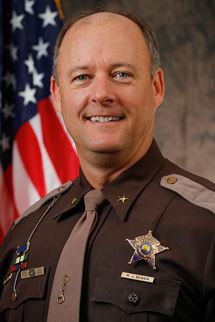Millions of Americans will travel our nation’s highways this Thanksgiving holiday to visit family and friends. With more vehicles on the road, the chances of being involved in a crash increase greatly.

Bowen
The Hamilton County Traffic Safety Partnership, a consortium of local law enforcement agencies, is joining more than 230 local law-enforcement agencies across the state to spot violations to Indiana’s seat belt and impaired driving laws. Through the weekend after Thanksgiving, expect to see an increase in random patrols, saturation patrols and checkpoints. This overtime enforcement is supported with National Highway Traffic Safety Administration (NHTSA) funds administered by the Indiana Criminal Justice Institute (ICJI).
“Why are we advertising this enforcement blitz? To give drivers and their passengers fair warning and to make our roads as safe as possible,” said Hamilton County Sheriff Mark Bowen. “Our officers live in the communities we serve and will be thankful this holiday if impaired-driving and unbuckled deaths never strike again.”
It’s the law
In every state, it is illegal to drive with a blood alcohol concentration of .08 or higher. In Indiana, drivers under 21 with a BAC of .02 or higher are subject to fines and a license suspension for up to one year.
Indiana has a primary seat-belt law, meaning that police officers may ticket unrestrained drivers or passengers, even if no other traffic violation has taken place. In addition, all passengers under age eight must be in an approved car seat or booster seat.
For more information about impaired driving visit on.IN.gov/drivesober and for more information about seat belts visit on.IN.gov/buckleup.
Seat belt tips
The ICJI and Purdue University Center for Road Safety estimate that about 93 percent of Hoosiers buckle up. The small number of drivers and passengers not wearing seat belts made up more than half of Indiana’s fatal crashes in 2016. Below are tips for proper seat-belt use:
- Secure the lap belt across your hips and pelvis, below your stomach.
- Place the shoulder belt across the middle of your chest and rib cage, away from your neck.
- Never put the shoulder belt behind your back or under an arm.
- If your seat belt doesn’t fit you, or you have an older car with lap belts only, ask your dealer or vehicle manufacturer about seat-belt adjusters, extenders or retrofits.
Motor vehicle crashes are a leading and increasing cause of death for children ages one to 13. Below are tips for properly selecting, installing and using child safety seats:
- Choose the right car seat for a child’s height and weight at gov/therightseat.
- Use a rear-facing infant or convertible seat until a child reaches the seat’s upper height or weight limit. Rear-facing harness straps should originate at or below the child’s shoulders. And never install a rear-facing seat in front of an active air bag.
- Once a child outgrows a rear-facing car seat, he or she is ready for a forward-facing car seat with harness. Always use the tether strap when installing a front-facing car seat. Front-facing harness straps should originate at or above the child’s shoulders.
- Tightly secure car seats using either the seat belt or the lower anchors, but not both, and that they are threaded through the correct path. Make sure the straps are snug and free of twists and that the car seat doesn’t move more than one inch.
- Buckling your child correctly is just as important as installing the seat correctly. Seat belts and harness straps should be snug and free of twists. If you can pinch harness straps between your fingers, the harness is not tight enough.
- To receive timely recall information, register your car seat with the manufacturer or using the form at gov/document/car-seat-registration-form.
Sober driving tips
Crashes involving at least one alcohol-impaired driver resulted in 211 Hoosier deaths and nearly 2,100 injuries during 2016. And the Thanksgiving holiday is one of the deadliest times of year.
With all of today’s options for getting home safely, there’s no excuse for getting behind the wheel impaired as it endangers you and everyone else around you. Law enforcement recommends these safe alternatives to impaired driving:
- Designate, or be, a sober driver.
- Use public transportation.
- Call a cab or a ridesharing service.
- Download the SaferRide mobile app on the Android Play Store or the Apple iTunes Store. This simple app only has three options: call a taxi, call a friend, and identify your location for pickup.
- Celebrate at home or a place where you can stay until sober.
- Throwing a party? Offer non-alcoholic beverages and plenty of food.
- Never provide alcohol to minors.
- Ask young drivers about their plans.
- Friend or family member about to drive? Take the keys and make alternate arrangements.
Impaired driving is three times more common at night than during the day. If you see an impaired driver, turn off the road away from the vehicle and call 911. Signs of impaired driving include:
- Weaving, swerving, drifting, or straddling the center line
- Driving at a very slow speed
- Braking erratically
- Making wide turns
- Stopping without cause
- Responding slowly to traffic signals
- Driving after dark with headlights off
- Almost striking an object or vehicle
- Driving on the wrong side of the road
- Turning abruptly or illegally
